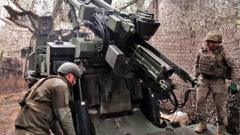In the face of devastation and ongoing battles, soldiers express belief in the possibility of negotiations with Russia, but are deeply skeptical about territorial concessions.
**Cautious Optimism Among Ukrainian Soldiers Amidst Ongoing Conflict**

**Cautious Optimism Among Ukrainian Soldiers Amidst Ongoing Conflict**
As diplomatic talks spark cautious hope, Ukrainian troops grapple with the realities of war.
Despite the purveyors of war in Eastern Ukraine, a sense of cautious optimism has emerged among some Ukrainian front-line soldiers who are witnessing ongoing diplomatic discussions between Russia and Ukraine for the first time in three years. These talks come after an extended period of resistance from Russia to engage in negotiations.
At the forefront of these sentiments is a soldier identified as Kozak, who contemplates the prospect of ceasefire talks. "I want to believe this would be the beginning of the end of the war," he asserts, highlighting how deeply personal the conflict feels for those who fight on the ground. As he points out, numerous soldiers have lost friends and family, influencing their reluctance to cede territory, fearing that doing so will only postpone further violence.
The situation is currently dire around Pokrovsk, a crucial transport hub within the Donetsk region, where Ukrainian artillery reacts to movements of Russian forces nearby. The area has seen increasing devastation compared to six months ago, resulting from intense battles. Soldiers have not only observed losses on the front lines but the destruction of homes and infrastructure, fueling their determination to resist any talk of handing over land in the interest of peace.
The advances in warfare technology, including drone warfare that has caused heavy casualties for both sides, necessitate the soldiers’ reliance on accurate intelligence and rapid artillery response. As garage-heated camouflaged artillery units engage the enemy, concerns about sufficient ammunition supply persist.
The emotional toll on Ukrainians extends beyond the battlefield, affecting families like that of Yana Melnikova, who mourns her son, a drone operator killed in combat. She expresses no faith in the talks leading to positive results, speaking instead to the insatiable greed of Russia for Ukrainian territory. Her hope remains tied to the overarching goal of reclaiming sovereignty and the memory of her child, reinforcing the sentiment that sacrifices in the fight for their homeland must not be in vain.
As Ukraine's soldiers navigate the harsh realities of war and the complexities of geopolitical negotiations, their voices echo the broader struggle for national identity, freedom, and the personal cost of conflict.
At the forefront of these sentiments is a soldier identified as Kozak, who contemplates the prospect of ceasefire talks. "I want to believe this would be the beginning of the end of the war," he asserts, highlighting how deeply personal the conflict feels for those who fight on the ground. As he points out, numerous soldiers have lost friends and family, influencing their reluctance to cede territory, fearing that doing so will only postpone further violence.
The situation is currently dire around Pokrovsk, a crucial transport hub within the Donetsk region, where Ukrainian artillery reacts to movements of Russian forces nearby. The area has seen increasing devastation compared to six months ago, resulting from intense battles. Soldiers have not only observed losses on the front lines but the destruction of homes and infrastructure, fueling their determination to resist any talk of handing over land in the interest of peace.
The advances in warfare technology, including drone warfare that has caused heavy casualties for both sides, necessitate the soldiers’ reliance on accurate intelligence and rapid artillery response. As garage-heated camouflaged artillery units engage the enemy, concerns about sufficient ammunition supply persist.
The emotional toll on Ukrainians extends beyond the battlefield, affecting families like that of Yana Melnikova, who mourns her son, a drone operator killed in combat. She expresses no faith in the talks leading to positive results, speaking instead to the insatiable greed of Russia for Ukrainian territory. Her hope remains tied to the overarching goal of reclaiming sovereignty and the memory of her child, reinforcing the sentiment that sacrifices in the fight for their homeland must not be in vain.
As Ukraine's soldiers navigate the harsh realities of war and the complexities of geopolitical negotiations, their voices echo the broader struggle for national identity, freedom, and the personal cost of conflict.























